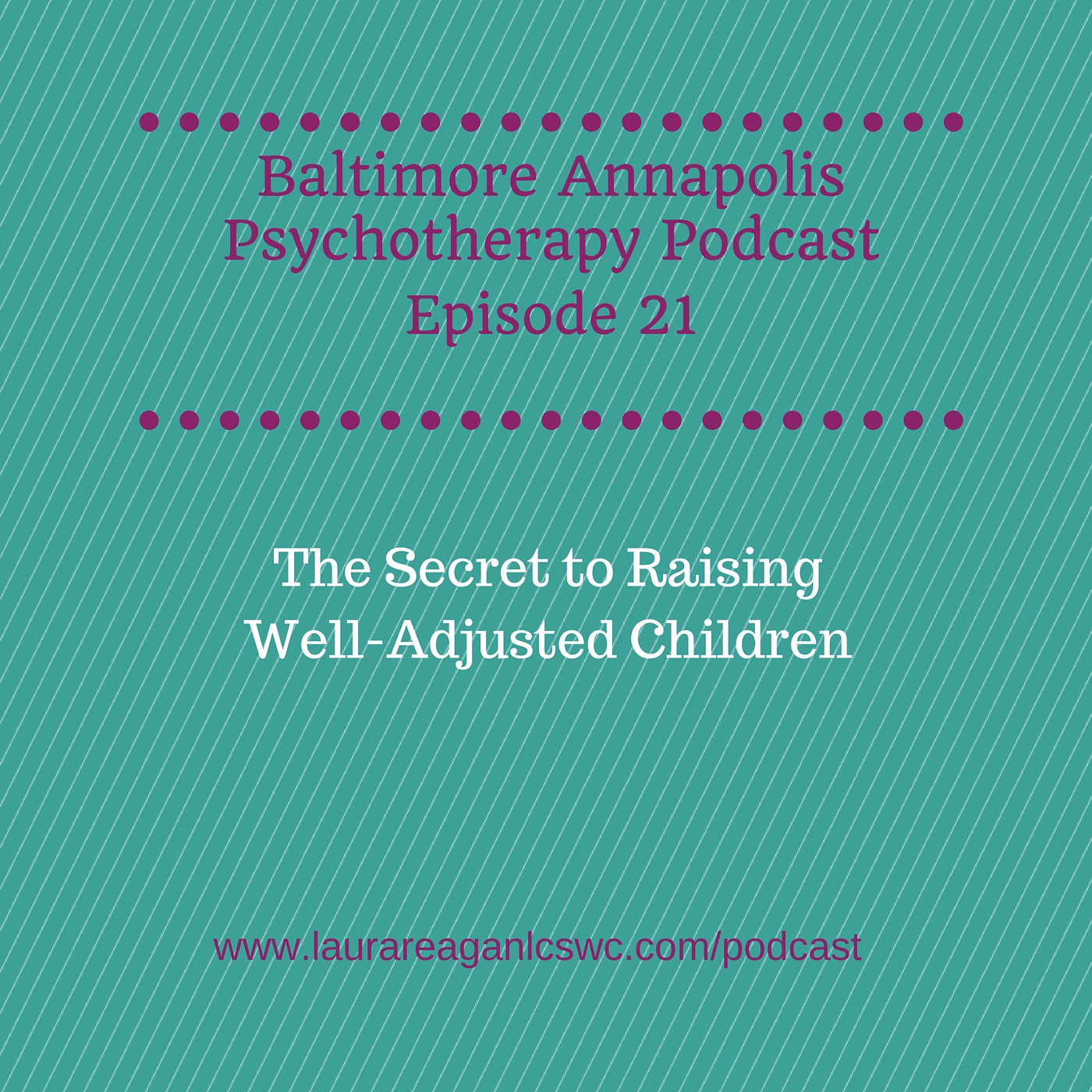Three simple rules for raising well-adjusted children
I think we can all agree that a central goal of parenthood is to raise children who are well-adjusted - meaning they can handle the ups and downs of life, function well in relationships as well as at school and work, and have satisfying inner lives. So how do we accomplish this? There are so many different ideas out there about how to be a "good" parent. So I'll add my voice to the discussion. Click here or on the image below to listen to podcast episode 21.
I believe there are three simple rules which will help your children grow up to be well adjusted, generally happy adults. Read below to learn what they are!
1. Learn about child brain development.
Much of the frustration of parenting comes from our failure to understand the child's behavior. For example, many of us find it extremely upsetting when a two year old says "No!" over and over. They call those years the Terrible Twos. I know when I was a parent of a young toddler I was afraid that I wouldn't be able to get my child to listen to me once he turned two. I had no idea how to handle toddlerhood.
However, there was one thing I did right. Knowing that I was clueless about babies and being a parent before I had my first child, I bought books and subscribed to magazines that taught me what I needed to know. This was before the internet was really a thing. I mean, it existed, but nobody I knew used it then. I really wanted to be a good parent and I had absolutely no idea how. So I called in the experts, and it made a difference!
Learning about child brain development is useful for several reasons. First, it helps you know what to expect and how you can adapt as your child grows and changes. If you haven't noticed, children are constantly doing that. The more flexible we can be, the better we can work together with our children.
There are tons of great resources for learning about child brain development. Now that we have the internet at our fingertips, literally (you're probably reading this on your phone), we can use websites like www.healthychildren.org, operated by the American Academy of Pediatrics, for trusted advice on everything from physical to emotional to social development into young adulthood. You may have heard that we now know the human brain continues developing throughout childhood, reaching full maturity somewhere between the age of 21 to 25. So when we expect seventeen year olds to exercise impulse control, plan ahead, consider consequences of their behavior and think logically about their decisions, we're asking them to use parts of their brains which aren't fully developed yet.
How can we learn about child brain development? Visit the website I mentioned above from the American Academy of Pediatrics. Read a book about it. Dr. Dan Siegel, a brilliant child psychiatrist who has studied this for years, has written a number of books. A list of his books can be found by visiting his website here. The Whole Brain Child, Brainstorm: the Power and Purpose of the Teenage Brain, No Drama Discipline and Parenting From the Inside Out are all highly recommended reading for parents.
2. Be attuned to your own emotional experience.
What does this mean? It means knowing how you feel inside. Understanding your emotions as they are occurring. Maybe not understanding exactly why you're feeling what you're feeling, but at least being able to know something is going on. Throughout a given day you'll have emotions coming up. Contentment, happiness, longing, sadness, grief, fear, anxiety, irritation, impatience, excitement, frustration, worry, foreboding, anticipation and so many other emotions course through us all day and all night long.
Being attuned to your own emotional experience means you feel these feelings as they're occurring. You notice them. With mindfulness, you may observe them without getting caught up in them. With a lack of present moment awareness (the opposite of mindfulness) you may not notice them until they bubble up and out, catching you by surprise. If you have a habit of shutting off your awareness of your emotions (something I learned to do when I was about 7 years old), you may feel a very limited range of emotions, such as only worry or sadness. Those were my go-to emotions for a long time. But that habit, which can be very helpful when you have overwhelming emotions you don't know how to deal with in childhood, can lead to a lot of numbing and avoiding when you reach adulthood.
Examples of numbing and avoiding behaviors include getting sucked into the internet, gambling, compulsive shopping, comfort eating or depriving yourself of food, overworking, focusing on everyone else instead of yourself...you get the picture.
How can you get more attuned to your own emotional experience? Try this simple technique which is free and can be done any time, any place. Pause and ask yourself, what am I feeling right now? What do I notice in my body? How do I feel? See what happens. The key is to slow down and tune in to your body. It will tell you what you need to know. If you're really good at blocking out emotions, it might take some practice before you really hear what it has to say. Another way to become attuned to your emotional experience is through mindfulness meditation. Try downloading my free Mindfulness Body Scan guided meditation from my website. Click here to download for free. If a lack of understanding of your own emotional experience is getting in your way, find a therapist who can help you work on this. If you're in Maryland, I'd love to help! Information on how to contact me is at the end of this article.
3. Be attuned to your child's emotional experience.
As you might guess, this is like being attuned to your own experience, but it's noticing what your child is feeling instead of yourself. Using your awareness of developmental explanations for your child's behavior (see #1, above), you can understand what the behavior is telling you about your child's emotional experience. For example, a 10 month old baby who cries when you put him or her down is not "spoiled," but rather seeking the comfort and safety of connection with you. It's developmentally normal for children to have separation anxiety at this age (but not only at this age! See this article for more). Becoming angry or impatient with your child for fussing and crying when you leave ignores the child's emotional experience and doesn't help the situation. And, if you're not attuned to your own emotional experience you may become flooded with emotions when your child becomes fussy. Instead of reacting in a way which is congruent with your values related to parenting, you may lash out in some way, leaving you feeling ashamed and helpless. Your child may also feel ashamed and helpless.
Attending to your child's emotional experience appropriately helps your child feel safe and secure in the world. That sense of safety and security - known as secure attachment - is important to growing up to be a well-adjusted adult. You can get more information on attachment by reading this article. It's also covered in the book Parenting from the Inside Out by Dan Siegel and Mary Hartzell which I mentioned above. Sometimes your own attachment or childhood experience of trauma gets in the way of developing a close connection with your child.
If you're in Maryland and you'd like some support in healing trauma and attachment click here to see if working together would be a good fit. You can also e-mail me at laura@laurareaganlcswc.com or call me at (443) 510-1048. If you're outside of Maryland, find a therapist who can help you work on trauma and attachment. It is never too late.
Want to hear more of what I have to say? You can sign up for my newsletter. I'm not one to bombard you with newsletters and clog up your inbox. I send them every so often when I have something to say that I think you might find useful. You can also follow me on Twitter, Facebook, Pinterest Instagram & Google+.
And to listen to The Baltimore Annapolis Psychotherapy Podcast you can click here! Please consider leaving a review on iTunes if you like it!
Wholeheartedly,
Laura Reagan, LCSW-C
Sources:
Arain, M., Haque, M., Johal, L., Mathur, P., Nel, W., Rais, A., Sandhu, R. & Sharma, S. (April, 2013). Maturation of the adolescent brain. Neuropsychiatric Disease Treatment. Retrieved on February 29, 2016 from: http://www.ncbi.nlm.nih.gov/pmc/articles/PMC3621648/
Laslockey, M. (2014, February 13). How to stop attachment insecurity from ruining your love life. Retrieved on February 29, 2016 from: http://greatergood.berkeley.edu/article/item/how_to_stop_attachment_insecurity_from_ruining_your_love_life
Schlossberg, S. (n.d.). Separation Anxiety Age by Age. Retrieved on February 29, 2016 from: http://www.parenting.com/article/separation-anxiety-age-by-age




